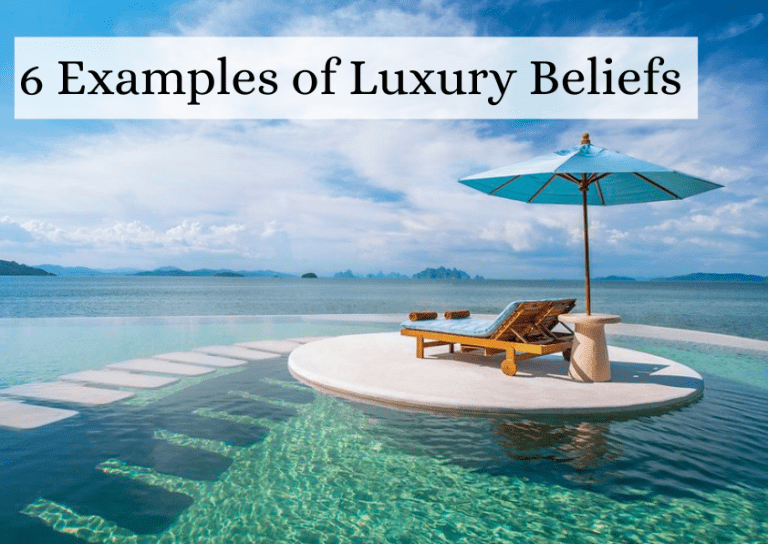Previously, I described “luxury beliefs” as markers of status for elites (within a community or culture) while often being harmful to ordinary people. While much more could be said, that brief summary will suffice for now. Instead, as promised, I’ll use this post to provide several potential examples that illustrate how luxury beliefs work out in practice.
Here are three illustrative examples of luxury beliefs:
-
Radical Environmentalism
This encompasses beliefs that advocate for extreme measures to combat climate change, such as the complete cessation of fossil fuel use within a very short timeframe or the significant reduction of human populations to decrease carbon footprints. While the underlying concern for the environment is valid and necessary, the extremity of some proposed solutions often fails to consider the immediate practical implications for the majority of the global population.
For instance, the rapid elimination of fossil fuels without viable and accessible alternatives could lead to economic collapse in regions dependent on these industries for employment. Moreover, such drastic measures may not account for the needs of developing countries, where access to clean energy is limited. The luxury of advocating for radical environmentalism is thus characterized by a detachment from the immediate economic and practical realities faced by less affluent individuals and communities.
-
Defunding the Police
The call to “Defund the Police” emerged from social movements promoting police reform, following high-profile cases of police brutality. This belief entails reallocating funds from police departments to other community resources (like mental health services, education, and housing) in an attempt to address the root causes of crime and reduce the reliance on policing and incarceration.
While the intention behind this belief is praiseworthy— to create a more equitable and just society, its classification as a “luxury belief” stems from its potential implications for harming communities already underserved and facing high crime rates.
For affluent people, reducing police funding would have a minimal impact. They often pay for private security services or live in areas with lower levels of crime. Moreover, the social and moral capital gained from advocating such a cause aligns with progressive ideals, signaling a sophisticated understanding of systemic issues.
However, for residents in high-crime neighborhoods, the presence of police is a crucial factor in ensuring safety. The luxury belief of defunding the police oversimplifies reality and the complex challenge of bringing about needed reform while also protecting people. In this way, luxury beliefs reflect a gap between ideological advocacy and the experiences of those in different socio-economic realities.
-
Contemporary Beliefs about Marriage and the Nuclear Family
Contemporary beliefs challenging the traditional models of marriage and the nuclear family often reflect luxury beliefs. Perhaps, someone says that marriage is an outdated institution or promotes polyamory or open relationships as equally valid or preferable alternatives to marriage. Some people claim the nuclear family is not necessary for raising children. Advocates of these beliefs want to deconstruct traditional institutions in favor of more fluid, individualized approaches to relationships and family life.
Yet, these views all exemplify the characteristics of luxury beliefs. For individuals in a higher socio-economic class, experimenting with alternative relationships or criticizing the nuclear family may have fewer risks. Such people often have the resources to mitigate potential negative outcomes, such as financial instability or access to childcare. At the same time, endorsing these beliefs serves as a marker of social and intellectual progressiveness.
For many in less affluent circumstances, however, a traditional family structure gives essential social and economic support not easily replicated by alternative approaches. The stability and security afforded by traditional marriage and family units can be critical in environments lacking communal and state resources. Thus, advocating for dismantling these institutions is a luxury, a privileged view, detached from the necessity of these structures for others.
-
Careerism
Careerism is the belief that a person should prioritize their career over other aspects of life. From this perspective, people should pursue personal advancement and success as the ultimate goals. Such careerism exemplifies a luxury belief.
First, it presupposes access to career opportunities and pathways not universally available to others. The belief highlights a divide between those with the resources, education, and networks to climb the career ladder, and those for whom such opportunities are out of reach.
Second, careerism underestimates the value of work-life balance, community involvement, and the non-material aspects of life that contribute to well-being. For individuals in high socio-economic brackets, prioritizing a career above all else seems like a feasible and rewarding choice. However, this perspective does not resonate with or is not practical for everyone, especially those who value or depend on strong family and group ties.
-
Beliefs about College
The belief that “a traditional four-year college degree is the only path to success” is an example of a luxury belief. This view stresses the importance of higher education as a prerequisite for a successful career and societal respect. Unfortunately, it overlooks the value of vocational training, apprenticeships, and other forms of education.
Advocating for the pursuit of college degrees aligns with values of self-improvement and ambition, yet advocates might fail to acknowledge the diverse talents and paths to fulfillment. Success does exist outside the academic sphere. Moreover, the rising costs of college education and the burden of student debt raise questions about the accessibility and sustainability of this path. For those in privileged positions, the value placed on a college education not only reflects a commitment to traditional markers of success but also overlooks the economic and practical realities facing countless students and their families.
-
Healthy at Every Size (HAES)
The “Healthy at Every Size” (HAES) movement promotes the acceptance of all body sizes and challenges the conventional health paradigms related to weight. While more complex, this viewpoint can also serve as a luxury belief.
On the one hand, HAES endorses important principles of self-acceptance, challenging social stigmas, and recognizing that health is a multifaceted dynamic and extends beyond mere physical appearance. However, when HAES is used to minimize the importance of addressing obesity-related health risks, it can reflect a luxury belief.
This perspective may ignore the significant and well-documented health risks associated with obesity. Heart disease, diabetes, and hypertension are just a few examples. For individuals in places with limited access to healthcare, nutrition education, and healthy food options, the message that size is irrelevant to health does not fully address the underlying health disparities and challenges they face.
Thus, while promoting body positivity and health at every size can be fantastic, it’s essential to balance these messages that consider diverse health realities and people’s needs across different populations.
Why have I dedicated an entire post to examples of luxury beliefs?
Ministering in a culture requires understanding that culture. Seeking the transformation of hearts entails our discerning ways that the human heart seeks status and belonging. The examples above illustrate the subtle ways that we fall into temptation, blindly seeking honor for ourselves at the harm of others all the while claiming that we’re loving people.














